
Alaska is a non-contiguous U.S. state on the northwest extremity of North America. It borders the Canadian province of British Columbia and the Yukon territory to the east; it shares a western maritime border in the Bering Strait with Russia's Chukotka Autonomous Okrug. The Chukchi and Beaufort Seas of the Arctic Ocean lie to the north and the Pacific Ocean lies to the south. Technically a semi-exclave of the U.S., it is the largest exclave in the world.
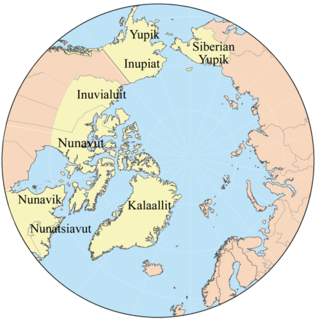
Eskimo is an exonym that refers to two closely related Indigenous peoples: Inuit and the Yupik of eastern Siberia and Alaska. A related third group, the Aleut, who inhabit the Aleutian Islands, are generally excluded from the definition of Eskimo. The three groups share a relatively recent common ancestor, and speak related languages belonging to the family of Eskaleut languages.
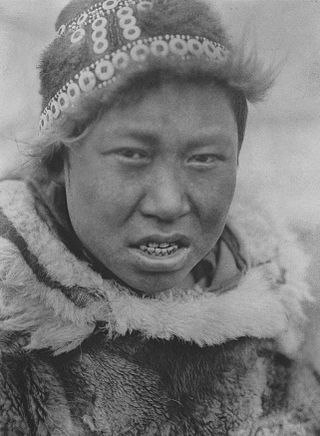
The Yupik are a group of Indigenous or Aboriginal peoples of western, southwestern, and southcentral Alaska and the Russian Far East. They are related to the Inuit and Iñupiat. Yupik peoples include the following:

Utqiagvik, formerly known as Barrow, is the borough seat and largest city of the North Slope Borough in the U.S. state of Alaska. Located north of the Arctic Circle, it is one of the northernmost cities and towns in the world and the northernmost in the United States, with nearby Point Barrow as the country's northernmost point.

Kotzebue or Qikiqtaġruk is a city in the Northwest Arctic Borough in the U.S. state of Alaska. It is the borough's seat, by far its largest community and the economic and transportation hub of the subregion of Alaska encompassing the borough. The population of the city was 3,102 as of the 2020 census, down from 3,201 in 2010.

The Iñupiat are a group of Alaska Natives whose traditional territory roughly spans northeast from Norton Sound on the Bering Sea to the northernmost part of the Canada–United States border. Their current communities include 34 villages across Iñupiat Nunaat, including seven Alaskan villages in the North Slope Borough, affiliated with the Arctic Slope Regional Corporation; eleven villages in Northwest Arctic Borough; and sixteen villages affiliated with the Bering Straits Regional Corporation. They often claim to be the first people of the Kauwerak.
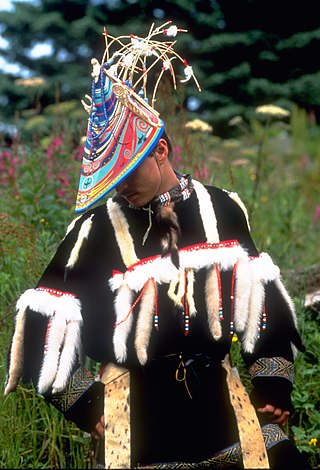
The Alutiiq people, also called by their ancestral name Sugpiaq, as well as Pacific Eskimo or Pacific Yupik, are one of eight groups of Alaska Natives that inhabit the southern-central coast of the region.
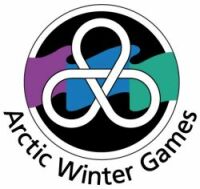
The Arctic Winter Games are a biennial multi-sport and indigenous cultural event involving circumpolar peoples residing in communities or countries bordering the Arctic Ocean.
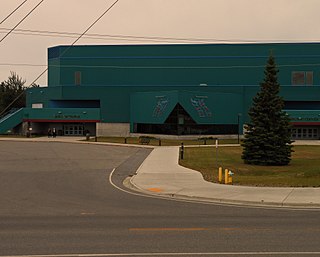
The Carlson Center is a 4,595-seat multi-purpose arena in Fairbanks, Alaska, United States. It is the third largest arena in Alaska by seating capacity after the Sullivan Arena and Alaska Airlines Center, both of which are in Anchorage. It is home to the University of Alaska Fairbanks Nanooks ice hockey team and also serves as the site for the university's commencement exercises as well as graduation ceremonies for Lathrop, West Valley, and North Pole High Schools. The building served as the site for the Top Of The World preseason college basketball tournament until its demise in 2007. Opening in 1990, the venue is named after John A. Carlson (1920–1988), who served as Fairbanks North Star Borough mayor from 1968 to 1982.

The Big Dipper Ice Arena, colloquially known as "The Big Dipper", is a multi-purpose arena in Fairbanks, Alaska. The arena is owned and operated by the Fairbanks North Star Borough. Originally constructed as an airplane hangar for the Lend-Lease program in Tanacross, southeast of Fairbanks, the building was dismantled, transported to Fairbanks and reassembled in 1968. It has undergone two major renovations since then. The building is home to the Fairbanks Ice Dogs ice hockey team. The borough's parks and recreation department is headquartered in the building.
Ann Fienup-Riordan is an American cultural anthropologist known for her work with the Yup'ik of western Alaska, particularly on Nelson Island and the Yukon–Kuskokwim Delta. She lives in Anchorage, Alaska. She received Historian of the Year awards from the Alaska Historical Society in 1991 and 2001.
The Alutiiq language is a close relative to the Central Alaskan Yup'ik language spoken in the western and southwestern Alaska, but is considered a distinct language. It has two major dialects:

As of 2020, Alaska has a population of 733,391.
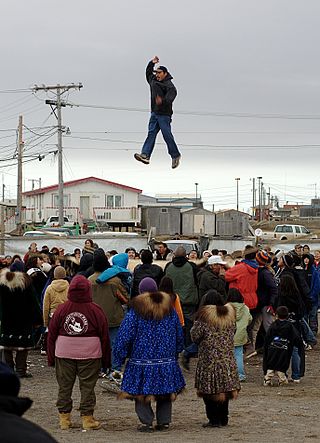
Nalukataq is the spring whaling festival of the Iñupiat of Northern Alaska, especially the North Slope Borough. It is characterized by its namesake, the dramatic Eskimo blanket toss. "Marking the end of the spring whaling season," Nalukataq creates "a sense of being for the entire community and for all who want a little muktuk or to take part in the blanket toss....At no time, however, does Nalukataq relinquish its original purpose, which is to recognize the annual success and prowess of each umialik, or whaling crew captain....Nalukataq [traditions] have always reflected the process of survival inherent in sharing...crucial to...the Arctic."

Reginald L. "Reggie" Joule, Jr. is a politician in the U.S. state of Alaska. Until recently, Joule served a three-year term as mayor of the Northwest Arctic Borough, having been elected to that position in 2012. He announced his intention to retire from public service at the end of his term.

The ear pull is a traditional Inuit game or sport which tests the competitors' ability to endure pain, and also strength. In the ear pull, two competitors sit facing each other, their legs straddled and interlocked. A two-foot-long loop of string, similar to a thick, waxed dental floss, is looped behind their ears, connecting right ear to right ear, or left ear to left ear. The competitors then pull upon the opposing ear using their own ear until the cord comes free or the opponent quits from the pain. The game has been omitted from some Arctic sports competitions due to safety concerns and the squeamishness of spectators; the event can cause bleeding and competitors sometimes require stitches.
The Inuit ear pull game is a harsh test of physical endurance....[in which] a thin loop of leather is positioned behind the ears of each of two competitors who then pull away from each other until one gives up in pain.

Dear Lemon Lima is a 2009 family comedy feature film written and directed by Suzi Yoonessi. Based on her short film of the same name and developed with the support of Film Independent and its Filmmaker Labs, this film is about a 13-year-old half-Yup’ik girl navigating her way through first heartbreak and the perils of prep school in Fairbanks, Alaska. In learning the meanings of love, friendship, and community, Vanessa Lemor finds her voice by embracing her heritage and reclaiming the spirit of the World Eskimo Indian Olympics (WEIO) at a private school where her narcissistic sweetheart's family is legendary.

An Eskimo yo-yo or Alaska yo-yo is a traditional two-balled skill toy played and performed by the Eskimo-speaking Alaska Natives, such as Inupiat, Siberian Yupik, and Yup'ik. It resembles fur-covered bolas and yo-yo. It is regarded as one of the most simple, yet most complex, cultural artifacts/toys in the world. The Eskimo yo-yo involves simultaneously swinging two sealskin balls suspended on caribou sinew strings in opposite directions with one hand. It is popular with Alaskans and tourists alike. This traditional toy is two unequal lengths of twine, joined together, with hand-made leather objects at the ends of the twine.

Arctic sports or Inuit games (Iñupiaq: anaktaqtuat) refer to a number of sports disciplines popularly practiced in the Arctic, primarily by the indigenous peoples of the region, such as the Inuit. Arctic sports often refer to the sports of Yamal, Alaska, Greenland and parts of Canada, while sports of the First Nations are referred to as Dene games. Traditional Greenlandic sports are referred to as Kalaallit Pinnguaataat. Many of the sports and disciplines are largely athletic in nature, while others lean more towards martial arts or gymnastics.
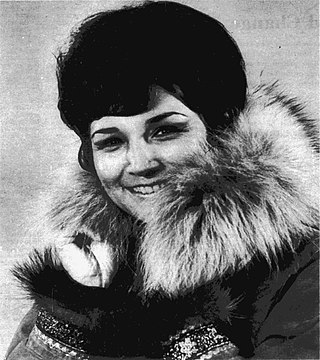
Laura Mae Bergt was an Iñupiaq athlete, model, politician, and activist for the Iñupiat and other Indigenous Alaskans. Born in the Northwest Arctic Borough of Alaska to bi-racial parents, she grew up in Nome and Kotzebue before attending high school in Sitka. Involved in the Native Olympic movement, she was both a nine-times winner of the Arctic Circle blanket toss event and served as chair of the World Eskimo Indian Olympics in 1966. She worked as a promoter for the new state of Alaska attending trade shows and making marketing appearances as a spokeswoman and guest on radio and television programs. From the 1960s, she worked in various policy positions at the tribal, local, state, and national level to address issues like disability, education, employment opportunities, housing, and poverty, and promoting the rights of Indigenous people.



















